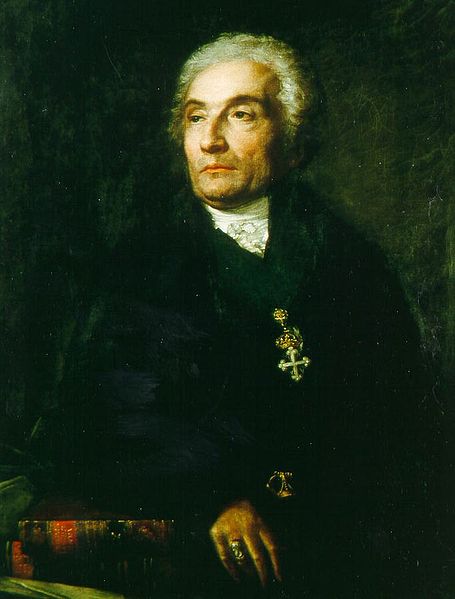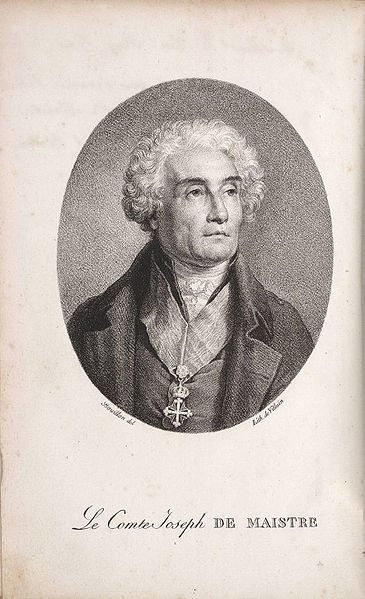<Back to Index>
- Philosopher Joseph Marie, comte de Maistre, 1753
- Writer Edmond Eugène Alexis Rostand, 1868
- President of the Swiss Federal Council Jean Pascal Delamuraz, 1936
PAGE SPONSOR


Joseph-Marie, comte de Maistre (1 April 1753 – 26 February 1821) was a French speaking Savoyard philosopher, writer, lawyer and diplomat. He was one of the most influential spokesmen for hierarchical monarchal state in the period immediately following the French Revolution of 1789. Despite his close intellectual and personal ties with France, Maistre remained throughout most of his life a subject of the King of Piedmont - Sardinia, whom he served as member of the Savoy Senate (1787 – 1792), ambassador to Russia (1803 – 1817), and minister of state to the court in Turin (1817 – 1821).
Maistre, one of the key intellectual figures of the Counter - Enlightenment, argued for the restoration of the Bourbon monarchy of France, which he regarded as a divinely sanctioned institution due
to the consecration of the kingly line by the Church, viewed monarchy
as the only stable form of government, argued for state recognition of
the Catholic Church, and for the indirect authority of the Pope over
temporal governments. According to Maistre, only governments founded
upon a Christian constitution, implicit in the customs and institutions
of all European societies but especially in Catholic European monarchies, could avoid the disorder and bloodshed that followed the implementation of rationalist political programs, such as the 1789 revolution. Maistre was an enthusiastic proponent of the principle of hierarchical authority, which the Revolution sought to destroy; he extolled the monarchy, he exalted the privileges of the Papacy, and saw the state as ultimately accountable to Divine Providence. Maistre was born in 1753 at Chambéry, in the Duchy of Savoy, which then belonged to the Kingdom of Piedmont - Sardinia, ruled by the House of Savoy. His family was of French origin. His grandfather André Maistre, who came from a modest Provençal background, had been a draper and councilman in Nice,
while his father François - Xavier had emigrated to
Chambéry in 1740, rising to the rank of Senator and magistrate,
and eventually receiving the title of count from the King of Piedmont - Sardinia. His mother's family, whose surname was Desmotz, were from Rumilly. Joseph's younger brother, Xavier, would become a military officer and a popular writer of fiction. Joseph was probably educated by the Jesuits. After
the Revolution, he became an ardent defender of their Order,
increasingly associating the spirit of the Revolution with the spirit
of the Jesuits' traditional enemies, the Jansenists. After completing his training in the law at the University of Turin in 1774, he followed in his father's footsteps by becoming a Senator in 1787. A member of the progressive Scottish Rite Masonic lodge
at Chambéry from 1774 to 1790, Maistre was initially sympathetic
to reform movements in France and supported the efforts of the
magistrates in the Parlements to force King Louis XVI to call the States - General.
As a landowner in France, Maistre was eligible to join that body, and
there is some evidence that he contemplated that possibility. He was alarmed, however, by the decision of the States - General to join the three orders of clergy, aristocracy, and commoners into the single legislative body that became the National Constituent Assembly, and he turned against the course of events in France after the revolutionary legislation of 4 August 1789 was passed (August Decrees). Maistre
fled Chambéry after it was taken by a French revolutionary army
in 1792. Unable to find a suitable position in the royal court in
Turin, he briefly returned to Chambéry the following year, but
decided that he could not support the French controlled regime and soon
departed for Lausanne, in Switzerland. He visited the salon of Madame de Staël, where he discussed politics and theology, and began his career as a counter revolutionary writer with works such as Lettres d'un royaliste savoisien ("Letters from a Savoyard Royalist", 1793), Discours à Mme. la marquise Costa de Beauregard, sur la vie et la mort de son fils ("Discourse to the Marchioness Costa de Beauregard, on the Life and Death of her Son", 1794) and Cinq paradoxes à la Marquise de Nav... ("Five Paradoxes for the Marchioness of Nav...", 1795). From Lausanne, Maistre emigrated to Venice, and then to Cagliari,
where the King of Piedmont - Sardinia was exiled after the French armies
took control of Turin in 1798. Maistre's relations with the court at
Cagliari were not always easy, and in 1803 he was sent to Saint Petersburg, Russia, as ambassador to Tsar Alexander I.
There Maistre, whose diplomatic responsibilities were few, became a
well loved fixture in aristocratic circles, converting many friends to
Roman Catholicism, and writing his most influential works on political
philosophy. Maistre's
observations on Russian life, contained in his diplomatic memoirs and
in his abundant personal correspondence, would become one of Tolstoy's sources for the novel War and Peace. After the defeat of Napoleon and the restoration of the House of Savoy's dominion over Piedmont (under the terms of the Congress of Vienna) Maistre returned to Turin in 1817 and served there as magistrate and minister of state until his death. He died on 26 February 1821 and was buried in the Jesuit Church of the Holy Martyrs (Chiesa dei Santi Martiri). In Considérations sur la France ("Considerations on France," 1796), Maistre maintained that France had adivine mission as the principal instrument of good and of evil on Earth. He considered the Revolution of 1789 a Providential occurrence: the monarchy, the aristocracy, and the whole of the old French society, instead of using the influence of French civilization to benefit mankind, had promoted the atheistic doctrines of the eighteenth century philosophers. The crimes of the Reign of Terror were
the final fruition and logical consequence of the destructive spirit of
the eighteenth century, and the divinely decreed punishment for it. His short book Essai sur le principe générateur des constitutions politiques et des autres institutions humaines ("Essay on the Generative Principle of Political Constitutions and other Human Institutions," 1809), Maistre argues that constitutions are
not artificial products but come from God, who slowly brings them to
maturity. After the appearance in 1816 of his French translation of Plutarch's treatise On the Delay of Divine Justice in the Punishment of the Guilty, in 1819 Maistre published Du Pape ("On the Pope"). Unlike earlier monarchists, Maistre did not simply invoke the divine right of kings,
but also argued for the social utility of the belief in such a divine
right: any attempt to justify government on rational grounds will only
lead to the questioning of those grounds and to unsolvable arguments
about the legitimacy and expediency of any existing government. This,
in turn, will lead to violence and chaos. The social legitimacy of
government must therefore be based on compelling non-rational grounds,
which its subjects should not be willing (or allowed) to question.
Furthermore, all government must ultimately depend on a single, supreme
authority, not subject to any appeal. For Maistre, such ultimate
authority had to be tied to religion, and could in Europe only be provided by the person of the Pope. This analysis of the legitimacy of political authority foreshadowed some of the later concerns of sociologists such as Saint - Simon and Auguste Comte. Besides a voluminous correspondence, Maistre left two posthumous works. One of these, the Examen de la philosophie de Bacon, ("An Examination of the Philosophy of Bacon," 1836), develops a spiritualist epistemology out of a critique of Francis Bacon, whom Maistre considers a fountainhead of the Enlightenment in its most destructive form. The Soirées de St. Pétersbourg ("The Saint Petersburg Dialogues", 1821) is a theodicy in the form of a Platonic dialogue,
in which Maistre proposes his own solution to the age old problem of
the existence of evil. He argues that evil throws light upon the
designs of God. The shedding of blood, the expiation of the sins of the
guilty by the innocent, is for Maistre a law as mysterious as it is
indubitable, the principle that propels humanity in its return to God,
supplying an explanation for the existence and the perpetuity of war. Maistre has been described, together with the far more moderate English statesman and philosopher Edmund Burke, as one of the fathers of European conservatism.
Since the 19th century, however, his authoritarian "throne and altar"
conception of conservatism has declined in comparison with the more
modern conservatism of Burke. His stylistic and rhetorical brilliance,
however, have made him enduringly popular as a writer and
controversialist (his writings and speeches, in fact, bears a strong
similarity to the oratory of one of the key figures of late 20th
century conservatism, Ronald Reagan). The Catholic Encyclopedia of
1910 describes Maistre's style as "strong, lively, picturesque," and
adds, "animation and good humour temper his dogmatic tone. He possesses
a wonderful facility in exposition, precision of doctrine, breadth of
learning, and dialectical power." Alphonse de Lamartine, though a political enemy, could not but admire the splendour of Maistre's prose: Émile Faguet described
Maistre as "a fierce absolutist, a furious theocrat, an intransigent
legitimist, apostle of a monstrous trinity composed of Pope, King and
Hangman, always and everywhere the champion of the hardest, narrowest
and most inflexible dogmatism, a dark figure out of the Middle Ages,
part learned doctor, part inquisitor, part executioner". Isaiah Berlin in his Freedom and Its Betrayal notes that many view his writings as "the last despairing effort of feudalism... to resist the march of progress." but
Berlin argues that Maistre imposes "an official legitimist Catholic
framework upon what is really a deeply violent, deeply revolutionary,
ultimately Fascist inner passion" which rejects what it sees as the
shallow optimism of the Enlightenment. His fundamental doctrine is that nature is red in tooth and claw. What really fascinates him is power. Amongst those who admired him were the poets Charles Baudelaire,
who described himself a disciple of the Savoyard counter -
revolutionary, and claimed that Maistre had taught him "how to think." and Ezra Pound. Maistre also influenced the monarchist Charles Maurras and the counter - revolutionary political movement Action Française. The American politician Pat Buchanan has described Maistre as a "great conservative."